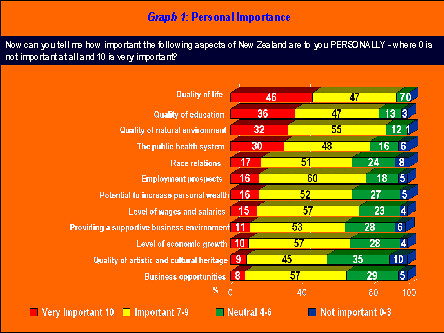There was an interesting series of articles in yesterday's Sunday Star-Times about the results of the Growth and Innovation Advisory Board's survey of our attitudes to economic growth. The results are pretty startling, as should be obvious from the graphic below:

(Graphic stolen from GIAB's research summary)
Economic growth, and the economy in general, are not a central concern for most New Zealanders. We care far more about "soft" factors such as quality of life, the environment, education and health instead. Questions of how important these issues are to the country as a whole give similar results; environment and quality of life come out on top, with economic and financial issues again taking a back seat (though less of one).
Other results are that economic growth is seen as having significant negative effects (particularly with regards to income inequality and traffic congestion) and as primarily benefiting future generations and younger New Zealanders (who, interestingly, don't agree with this at all), and that a shocking 40% of people don't believe that higher growth will deliver significant tangible benefits to them in health, education, jobs etc.
What does this mean? The obvious conclusion is that the neo-liberal program in New Zealand is dead. We just don't believe that shit anymore, if indeed we ever did. Politicians trying to sell economic growth and "getting back into the top half of the OECD" as an end in itself are pushing shit uphill.
The alternative strategy is to sell growth as a means to an end. Don Brash in particular has taken this line, arguing consistently that growth is the way we get and pay for the things we want. The problem with this line is that a) so many "business-friendly", pro-growth policies seem to be destructive of those other, more highly-valued goods; and b) a huge segment of the population don't believe it will have significant benefits to them. If there are no benefits, then why support it?
The temptation for the right will be to dismiss these attitudes as stupid, ignorant, or "ill-informed" (Brash calls them "worrying"). I'd welcome that, because I can think of no surer way to guarantee the right another three years in opposition than to deny the validity of people's values and abuse them for believing the evidence of their own experiences. No-one who lived through the 80's and 90's can seriously believe that wealth "trickles down" or that "a rising tide lifts all boats". No-one living through the aftermath can seriously believe that economic growth is an unquestionable good with no social costs. And no-one but an economist can seriously believe that the sole good human beings pursue or ought to pursue is private profit.
The flip side of this is that the survey reported some very positive results about individual attitudes. New Zealanders place a high value on ambition, hard work and innovation - values seen as central by business leaders. We seem to be relatively pro-business - except "big business", who we think are parasitical wankers. And we're keen enough to get ahead in our personal lives; we just don't see it as the be-all and end-all of existence. We will accept economic growth, just not at the cost of other goods we value. The challenge for growth's advocates is to find ways of growing which don't undermine those goods.





